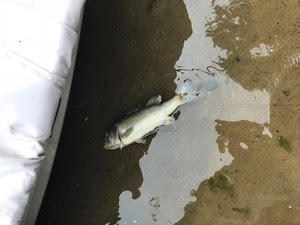Michigan: Largemouth bass virus re-emerges and is confirmed in Iosco County lake

After a 15-year hiatus, largemouth bass virus has re-emerged in a new northern Lower Peninsula water. This virus has been confirmed as a factor in a fish kill in Cedar Lake in Alcona and Iosco counties, Michigan, with additional lakes in the area being examined. This virus previously affected adult largemouth bass in the early 2000s in southern Michigan lakes.
Largemouth bass virus is one of more than 100 naturally occurring viruses that affect fish and is closely related to viruses found in frogs and other amphibians. Its origin and how it is spread are unknown, but anglers are considered a likely path for transmitting the virus through the movement of live, infected fish from one water to another, or by using contaminated and uncleaned gear or boats in uninfected waters. LMBV is not known to infect humans, and infected fish are safe to eat – as long as the fish is thoroughly cooked.
LMBV usually causes fish kills during periods when fish are most stressed. Potential stressors include very hot weather, intensive recreational fishing, and possibly aquatic weed or other treatments made during hot weather. Anything that can be done to minimize stress on fish will reduce the effects of this virus and subsequent fish deaths.
There are few outward signs that a fish has LMBV. The virus has been found in lakes with no reports of disease or mortalities of fish. Affected fish usually appear normal, although they may be lethargic, swim slowly and be less responsive to activity around them. Dying fish often are seen near the surface and have difficulty remaining upright. Upon internal examination, infected fish usually have bloated and yellowish swim bladders.
“Largemouth bass virus appears to infect other related fish species, including smallmouth bass, bluegill and black crappies, but to date is only known to kill largemouth bass,” said Gary Whelan, the DNR’s fisheries research manager. “The disease typically kills large adult fish and die-offs affect approximately 10 to 20 percent of these fish in a given lake.”
LMBV cannot be eradicated from lakes, nor can infected fish be treated. The best way to halt the virus is by anglers and boaters properly cleaning their equipment and doing their part to prevent the spread:
- Clean all fishing equipment between trips.
- Do not move fish or fish parts from one body of water to another.
- Handle bass gently if you intend to release them.
- Don’t keep bass in live wells for long periods of time if you plan to release them.
- Minimize the targeting of largemouth bass during very hot weather
- Report dead or dying adult largemouth bass, particularly when they’re in numbers of 25 or more – reports can be made online at michigan.gov/eyesinthefield.
For more information on fish diseases, visit the DNR’s website.





